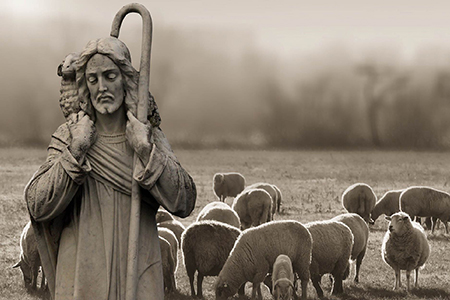Alleluia! Christ is risen! On this fourth Sunday of Easter, also known as the Good Shepherd Sunday, we renew our confidence in the one true God, our Good Shepherd, Lord Jesus Christ, who remains faithful and steadfast throughout our pilgrimage on earth. As the Psalmist proclaims, God is the one who “made us”, and therefore we belong to God; “We are his people, the sheep of his flock” to whom He tends (Ps 100:3). What an honour and privilege for us to be counted as one belonging to God’s fold.
This week’s first reading reveals the depth of Paul’s commitment to Jesus and his mission of bringing the Good News to the ends of the earth. Paul sees his mission as a fulfilment of what “the Lord has commanded”; he affirms the necessity of bringing light to the Gentiles by referring to Isaiah, “I have made you a light to the Gentiles, that you may be an instrument of salvation to the ends of the earth” (Acts 13:47). Paul contends that Jesus the Servant continues his mission through the servant apostles, that is, he and his companions in evangelization, who are sent to bring the Good News not only to the Jews but also the Gentiles (ref. Ignatius Catholic Study Bible 230). Indeed, Paul and his companions fully understand and accept the challenges and dangers that await them; they speak “boldly” even under threats of persecution. With the Holy Spirit working in them, even the ugliness of this whole encounter in Antioch has not diminished their joy and resolve. Like Jesus who has been rejected by His own, “no prophet is accepted in the prophet’s hometown”, Paul and Barnabas are met with “jealousy and … violent abuse” (Lk 4:24, Acts 13:45,46). Since they’re not welcomed in Antioch, instead of giving up, they take this as a sign for them to bring the Good News to the Gentiles, saying, “It was necessary that the word of God be spoken to you first, but since you reject it and condemn yourselves as unworthy of eternal life, we now turn to the Gentiles” (Acts 13:46). They then shake off the dust from their feet as a symbolic gesture of curse according to the Jewish custom, before continuing their mission, “filled with joy and the Holy Spirit” (Acts 13:52). Paul and Barnabas are the epitomes of faithfulness as evident in their courage, joy, and determination. As they urge the believers “to remain faithful to the grace of God”, following Jesus’ footsteps, they themselves are also blazing the way for other believers (Acts 13:43).
Indeed, the Good News is intended for everyone, Jews or Gentiles. In John’s vision, he sees “a great multitude, which no one could count, from every nation, race, people, and tongue” (Rev 7:9). The Good Shepherd welcomes everyone who desires to belong; those who “hear” His voice and follow Him. John’s vision also depicts a vision of love. It is the Lamb of God, the only Son of God, Christ the King, who provides food to those who hunger; “life-giving water” to those who thirst; shelter to those labour under the sun; comfort and peace to those who mourn; and most of all, eternal life to those who seek God (ref. Rev. 7:15-17, Jn 10:28). To the Good Shepherd, each sheep is not just a faceless and nameless resident in His fold; He knows and calls each by name. God’s love, indeed, knows no boundary. Jesus affirms that what the Father has given to Him, “no one can take them out of [His] hand” (Jn 10:28). Jesus has already proven His commitment to this great love when He willingly offered up His life as a sacrifice, once and for all, so that we, His sheep, may have life.
If today we hear God’s voice, let us harden not our heart! Indeed, we live in a world full of sound and fury; voices that deliberately pull us away from the sheepfold and our Shepherd. However, our Good Shepherd is faithful and steadfast, full of compassion and mercy; we can be assured that if we ask, He will lead us back to His fold of love.
